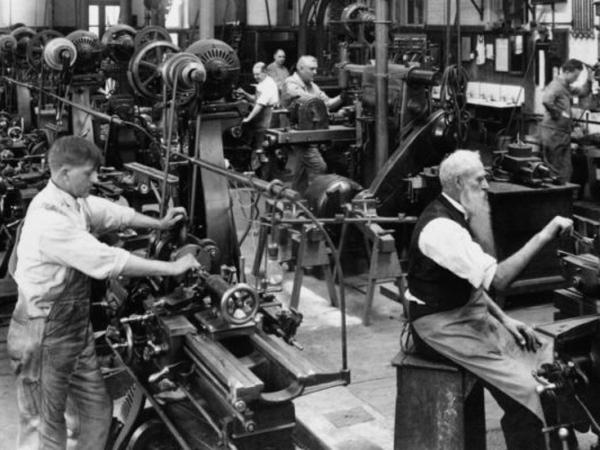Little Stories of the Big History: Industrial Revolution
At the beginning of the 18th century, humanity led a rural life very similar to that of its last 10.000 years.Since we decided to change a routine of nomadic hunters and collectors, for that of sedentary farmers and livestock, much more had not changed the thing.Most of the activities began with the sunrise and for the sunset we were already saved to rest.However, at the end of the 18th century we find paintings of the time that reflect how some cities in England spent the entire nights illuminated due to the flares that their steel ovens produced 24 hours a day.What events had given rise to such a change in less than 100 years, in the life of the English and that the entire world would soon live?
For the beginning of 1700 the vast majority of people could only afford to spend money on three things: build their home, buy food and acquire fabrics for their warm clothes.If one was a merchant and wanted to reach a mass audience, I had to aim for the sale of clothing.Thus, at that time a circuit began in England where the merchants bought cotton, they took it to peasants so that in their spare time they wove and after a few months they retired the production to sell it in the villages.However, logistics was a big problem.Given the rural context of clothing manufacturers, much effort was destined to take the raw material to their home and then move it to withdraw it once made.So soon it occurred to those peasants to work under the same roof.The advantages were gigantic: being all together, the tasks could be divided and each farmer will work on what was most skilled.Conclusion: it was made faster, producing more and at a lower cost given the concentration of labor.The market received with open arms the products of these first factories and thus, its consumption increased exponentially.
It is usually believed that the industrial revolution was explosive, immediate.But it lasted decades.Political revolutions can have a particular year, such as the French of 1789, but not necessarily economic.Today historians agree that it was in the 1780s that the first consequences of the Industrial Revolution came to see.

But let's go back to those first English factories full of former peasants accounted for in workers.Even working manually 16 hours per day, men, women and of course children;The workforce soon did not supply and the market continued to demand.It is then when automation begins to resort, incorporating machines that spin, weave and sew much faster than workers.Thus, we discovered that it was not the machines that originated the industrial revolution, but a consequence of it.
It is curious to know that England was not the first to discover the mass production of goods.Centuries earlier, both Germany and Italy and the Netherlands had had a take -off similar to English from the 18th century, pumping a large number of textiles to the market.In fact, resources that favor mass production, such as bank loans, were already common in the 15th century of the 15th century being the basis of the fortune of the Medici family.
However, all these attempts from continental Europe had been truncated, because once the local market had not had new customers who more sell.But in the 18th century, when England saturated its market, looked up towards other continents and with happiness found where to carry and sell its entire production surplus.At that time, Latin America already had 15 million inhabitants and was in full growth.And while the Spanish crown prohibited trade with another port other than Seville's own.Thus, England found the vein to sell through smuggling.
Hispanic -American ports such as that of Buenos Aires, received in an open secret, the goods of the English industrial revolution at a very beneficial price.Even trade was round trip since from America they reached English ports raw materials as disparate as cocoa, tobacco, sugar and especially leather.
Nowadays it is believed that without the Latin American market, the English industrial revolution would have failed as they had done before German, Italian and Dutch and Dutch centuries.










Related Articles